Oncology Nurse Resume Examples

Jul 18, 2024
|
12 min read
Crafting your oncology nurse resume: stand out with compassion and care. Learn how to highlight your skills and experience to land your dream job. It's time to inject some passion into your resume!
Rated by 348 people
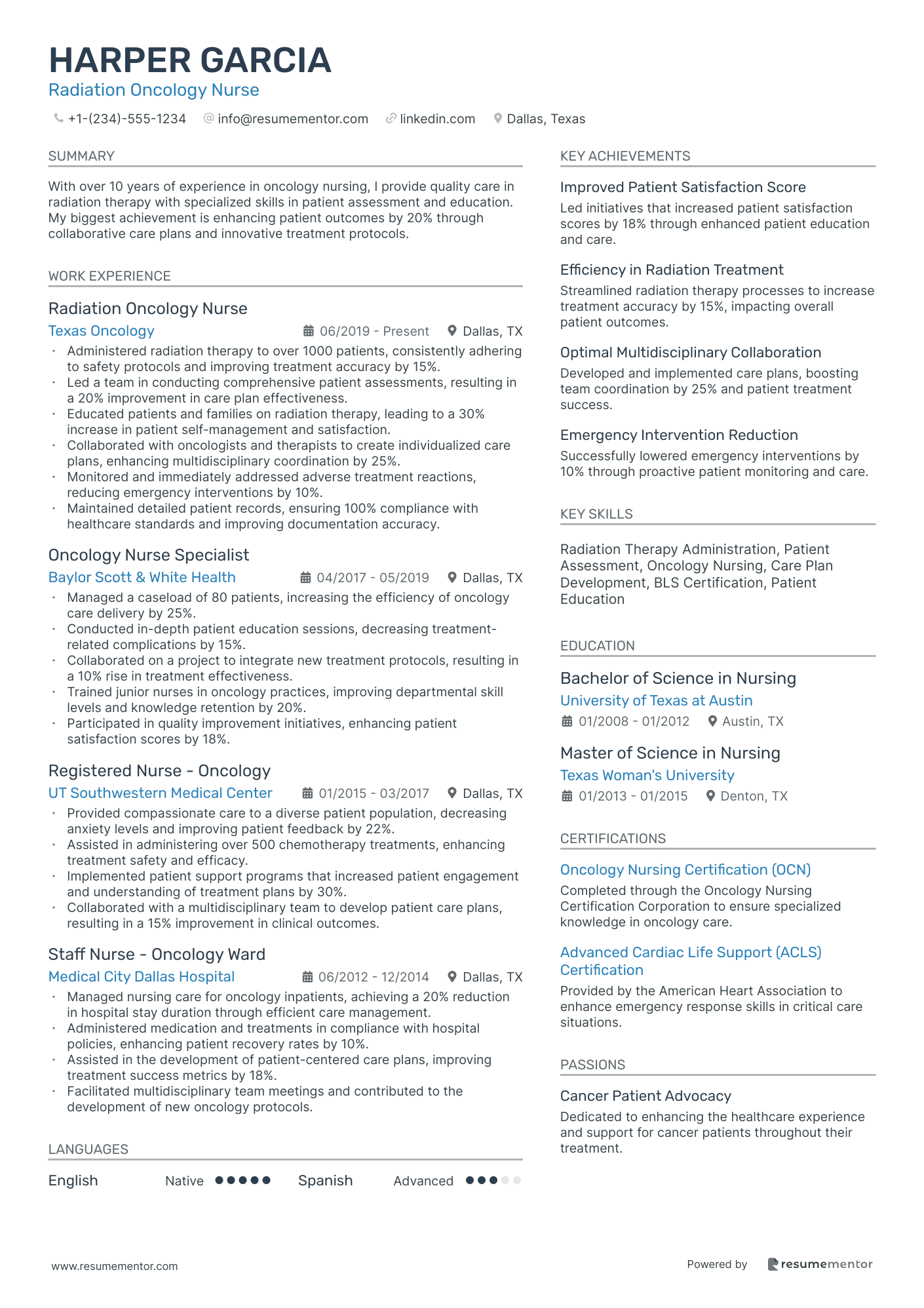
Radiation Oncology Nurse
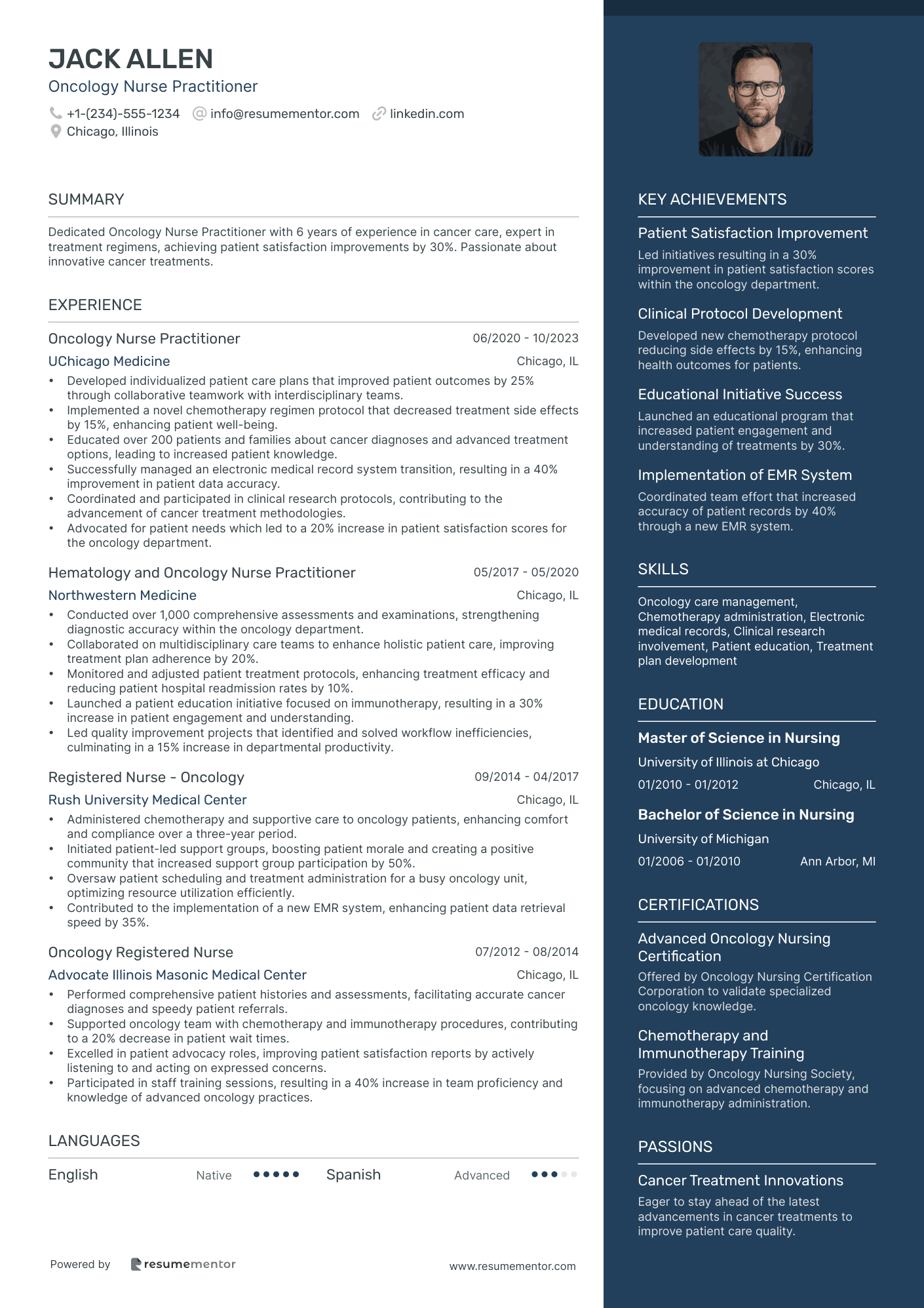
Oncology Nurse Practitioner
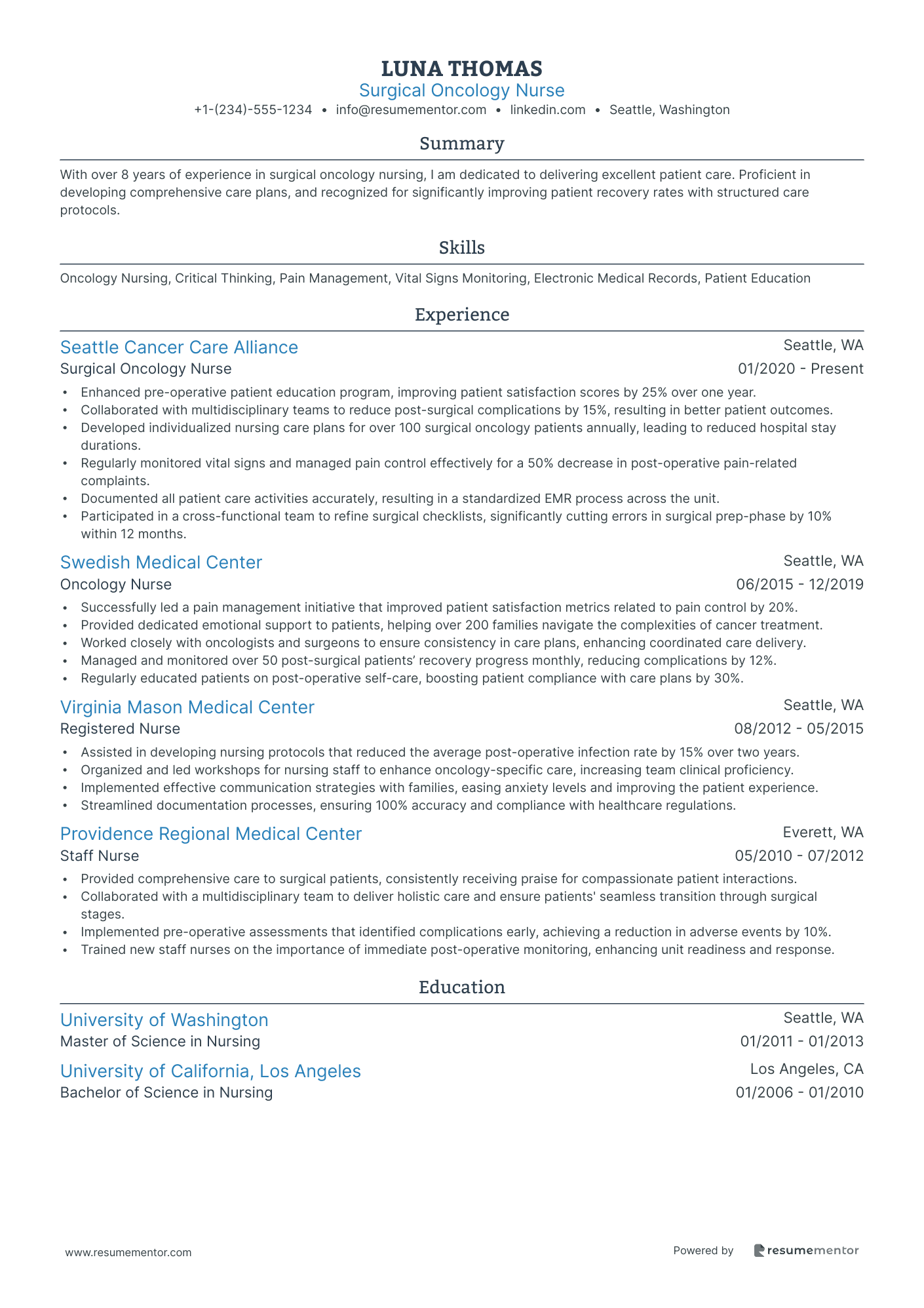
Surgical Oncology Nurse
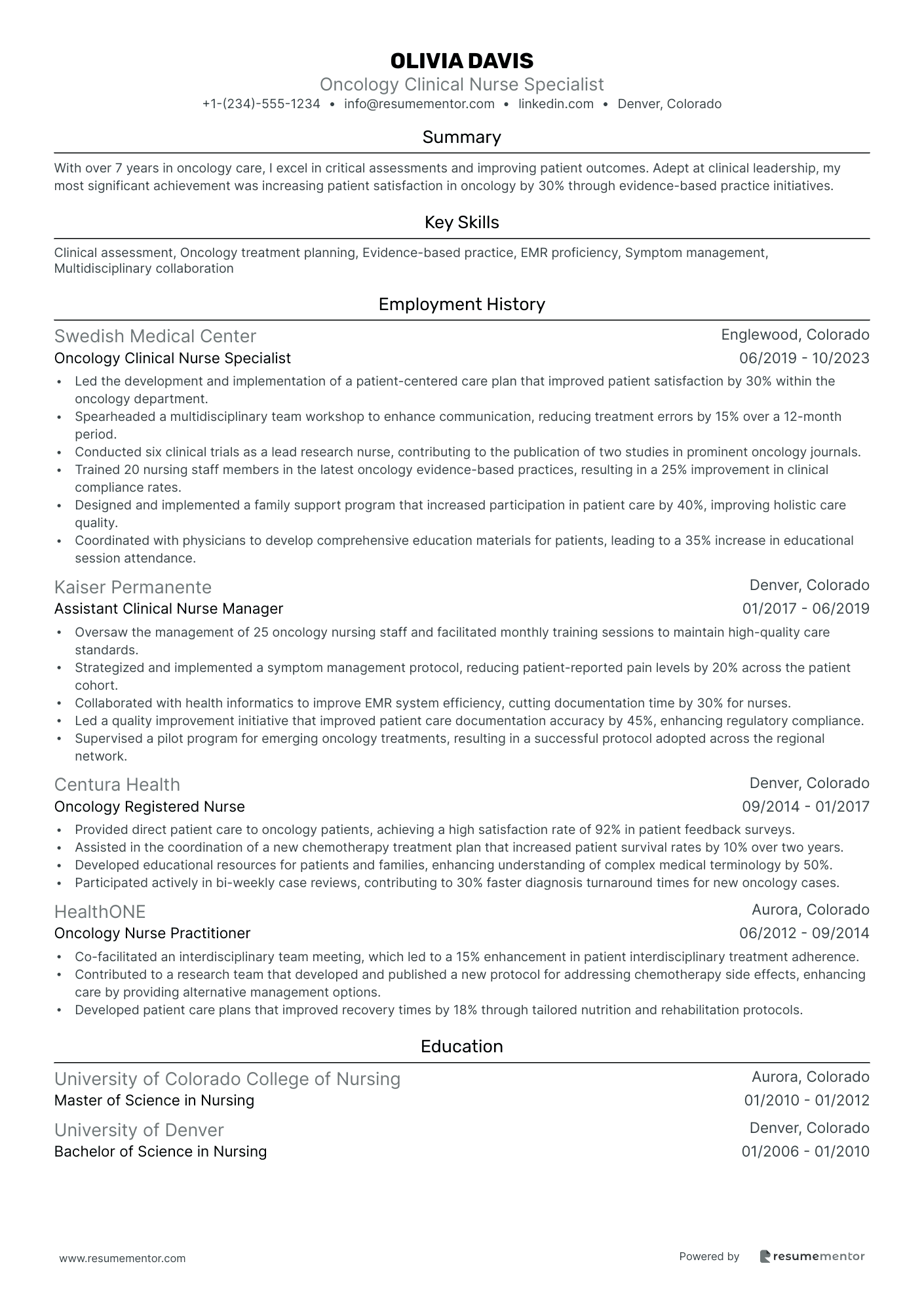
Oncology Clinical Nurse Specialist
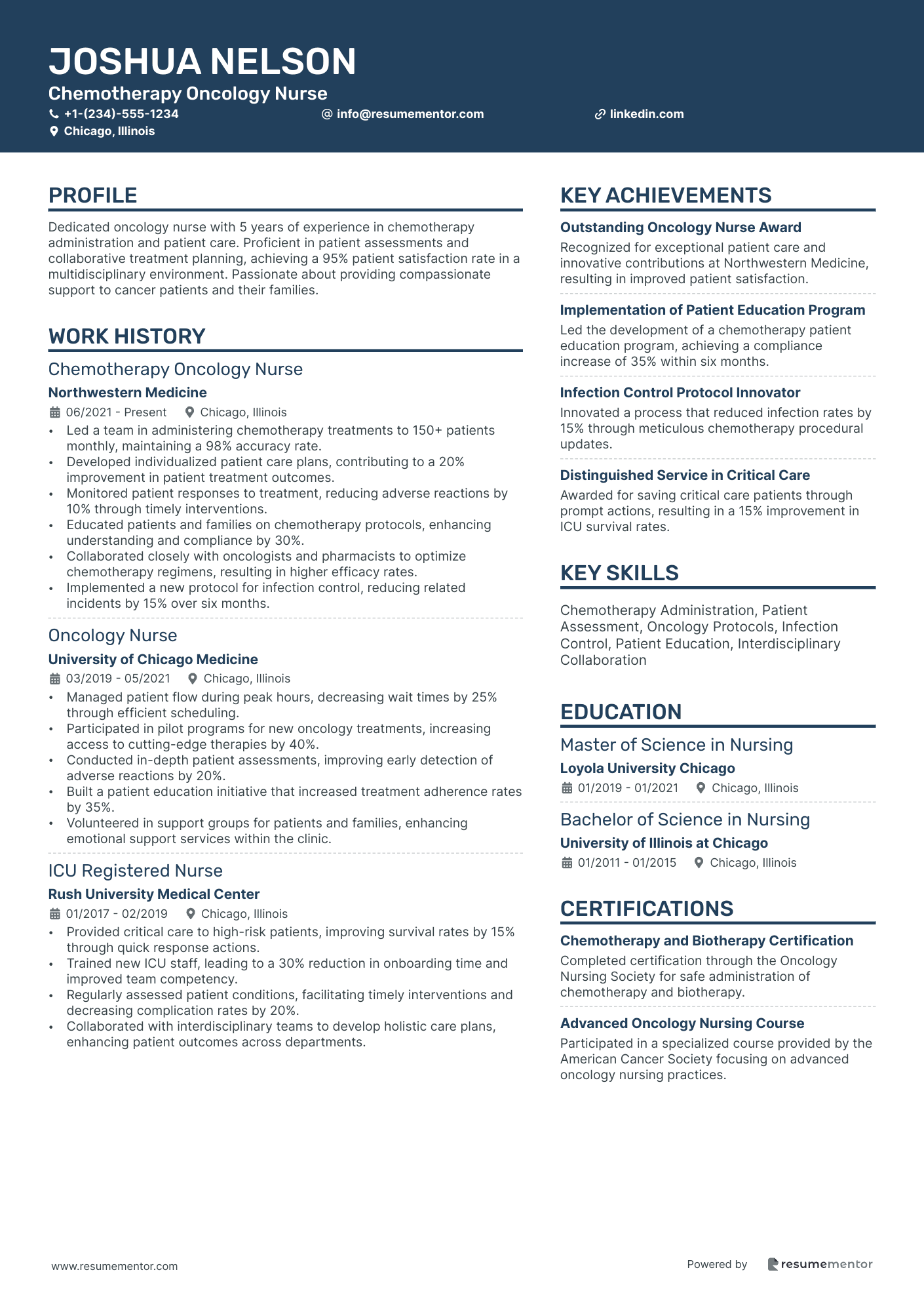
Chemotherapy Oncology Nurse
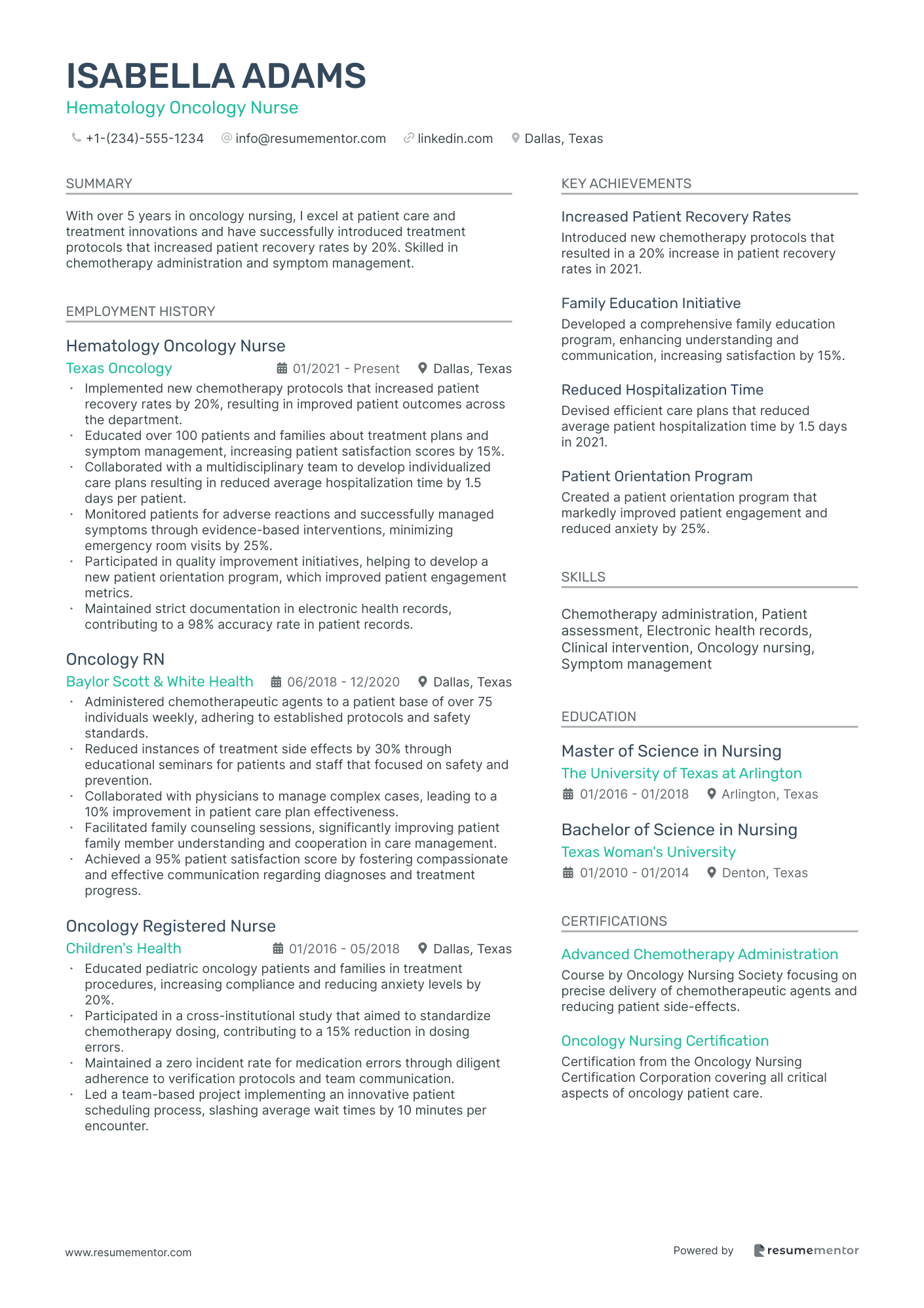
Hematology Oncology Nurse
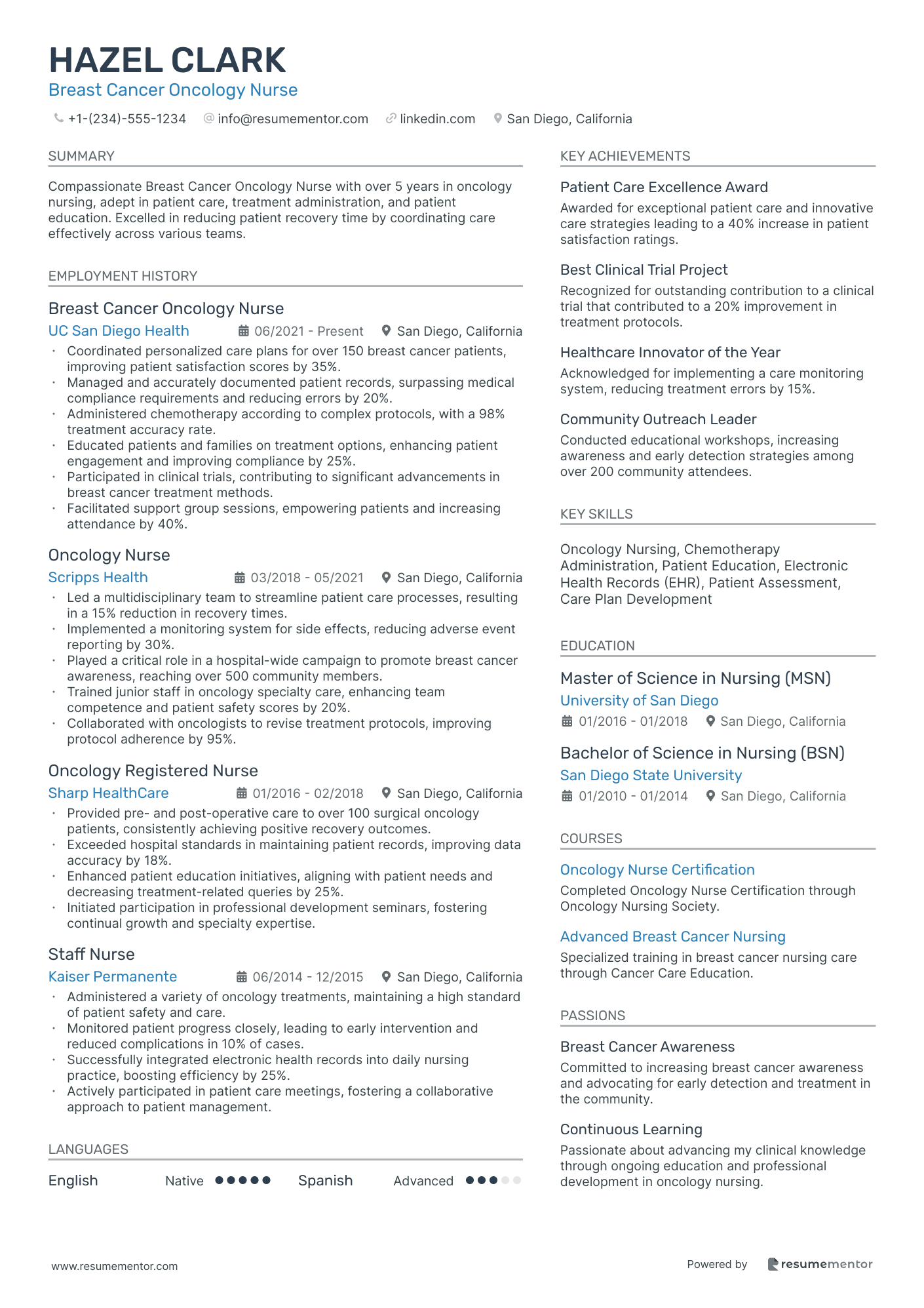
Breast Cancer Oncology Nurse
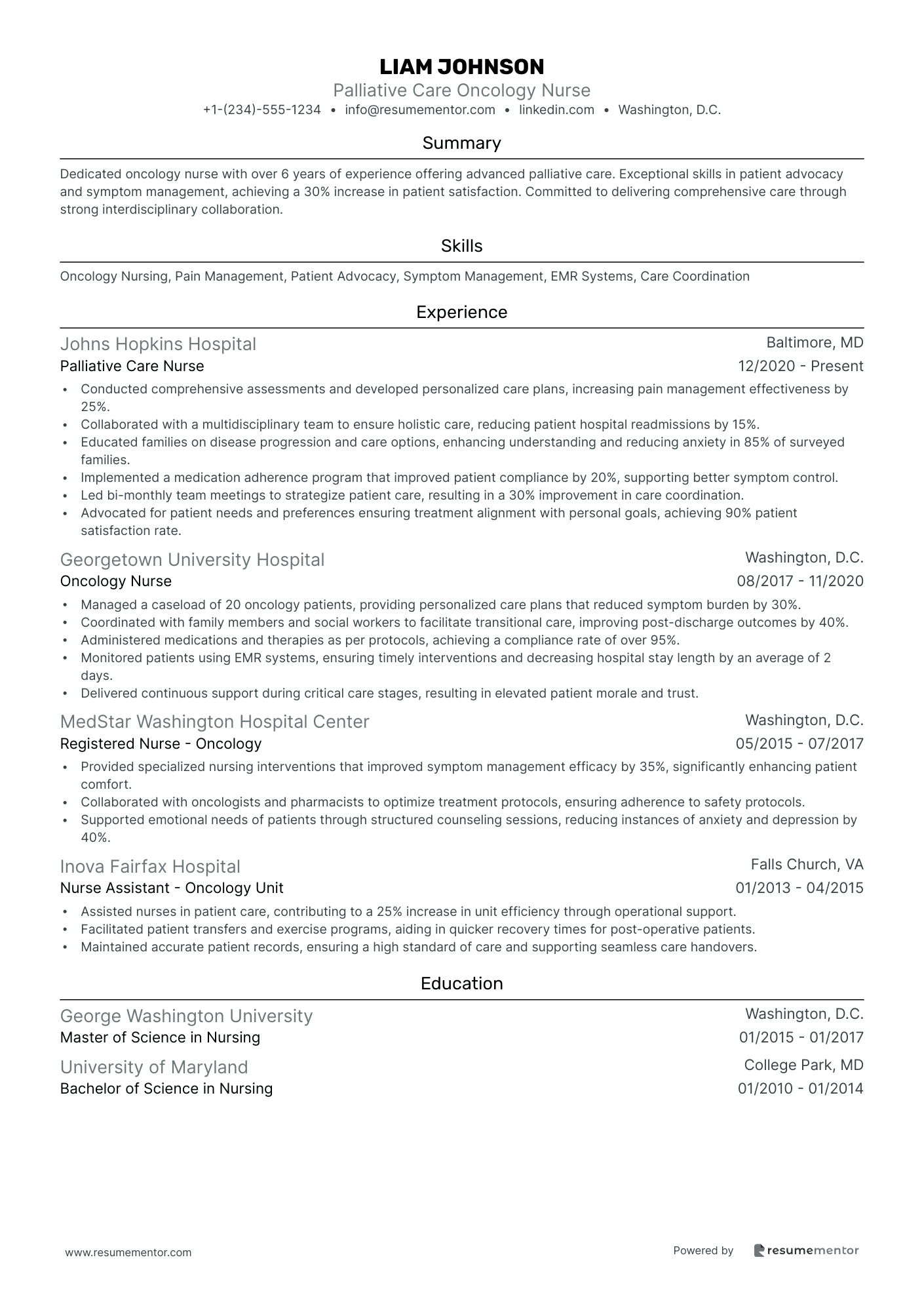
Palliative Care Oncology Nurse
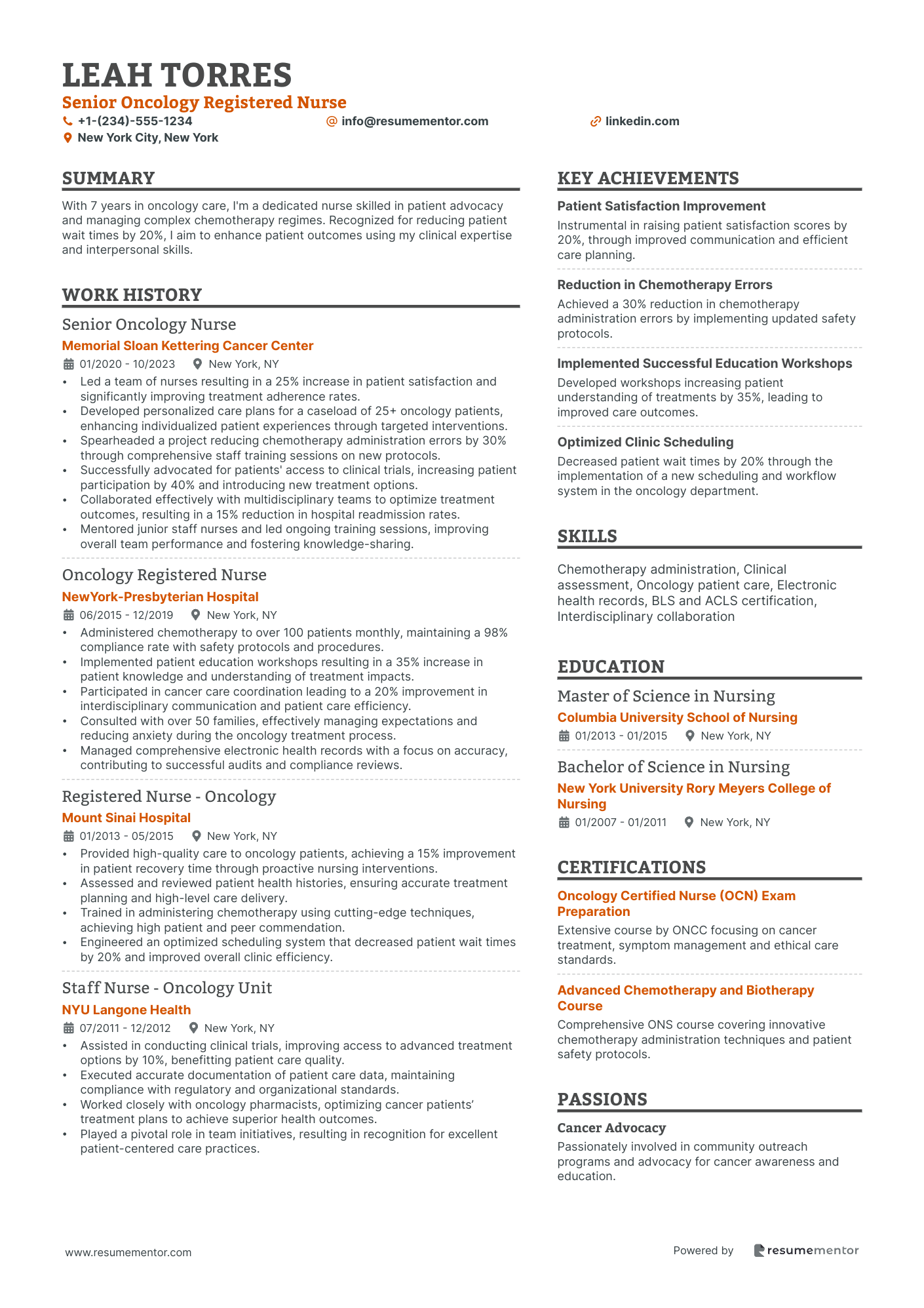
Senior Oncology Registered Nurse

Radiation Oncology Nurse resume sample
- •Administered radiation therapy to over 1000 patients, consistently adhering to safety protocols and improving treatment accuracy by 15%.
- •Led a team in conducting comprehensive patient assessments, resulting in a 20% improvement in care plan effectiveness.
- •Educated patients and families on radiation therapy, leading to a 30% increase in patient self-management and satisfaction.
- •Collaborated with oncologists and therapists to create individualized care plans, enhancing multidisciplinary coordination by 25%.
- •Monitored and immediately addressed adverse treatment reactions, reducing emergency interventions by 10%.
- •Maintained detailed patient records, ensuring 100% compliance with healthcare standards and improving documentation accuracy.
- •Managed a caseload of 80 patients, increasing the efficiency of oncology care delivery by 25%.
- •Conducted in-depth patient education sessions, decreasing treatment-related complications by 15%.
- •Collaborated on a project to integrate new treatment protocols, resulting in a 10% rise in treatment effectiveness.
- •Trained junior nurses in oncology practices, improving departmental skill levels and knowledge retention by 20%.
- •Participated in quality improvement initiatives, enhancing patient satisfaction scores by 18%.
- •Provided compassionate care to a diverse patient population, decreasing anxiety levels and improving patient feedback by 22%.
- •Assisted in administering over 500 chemotherapy treatments, enhancing treatment safety and efficacy.
- •Implemented patient support programs that increased patient engagement and understanding of treatment plans by 30%.
- •Collaborated with a multidisciplinary team to develop patient care plans, resulting in a 15% improvement in clinical outcomes.
- •Managed nursing care for oncology inpatients, achieving a 20% reduction in hospital stay duration through efficient care management.
- •Administered medication and treatments in compliance with hospital policies, enhancing patient recovery rates by 10%.
- •Assisted in the development of patient-centered care plans, improving treatment success metrics by 18%.
- •Facilitated multidisciplinary team meetings and contributed to the development of new oncology protocols.
Oncology Nurse Practitioner resume sample
- •Developed individualized patient care plans that improved patient outcomes by 25% through collaborative teamwork with interdisciplinary teams.
- •Implemented a novel chemotherapy regimen protocol that decreased treatment side effects by 15%, enhancing patient well-being.
- •Educated over 200 patients and families about cancer diagnoses and advanced treatment options, leading to increased patient knowledge.
- •Successfully managed an electronic medical record system transition, resulting in a 40% improvement in patient data accuracy.
- •Coordinated and participated in clinical research protocols, contributing to the advancement of cancer treatment methodologies.
- •Advocated for patient needs which led to a 20% increase in patient satisfaction scores for the oncology department.
- •Conducted over 1,000 comprehensive assessments and examinations, strengthening diagnostic accuracy within the oncology department.
- •Collaborated on multidisciplinary care teams to enhance holistic patient care, improving treatment plan adherence by 20%.
- •Monitored and adjusted patient treatment protocols, enhancing treatment efficacy and reducing patient hospital readmission rates by 10%.
- •Launched a patient education initiative focused on immunotherapy, resulting in a 30% increase in patient engagement and understanding.
- •Led quality improvement projects that identified and solved workflow inefficiencies, culminating in a 15% increase in departmental productivity.
- •Administered chemotherapy and supportive care to oncology patients, enhancing comfort and compliance over a three-year period.
- •Initiated patient-led support groups, boosting patient morale and creating a positive community that increased support group participation by 50%.
- •Oversaw patient scheduling and treatment administration for a busy oncology unit, optimizing resource utilization efficiently.
- •Contributed to the implementation of a new EMR system, enhancing patient data retrieval speed by 35%.
- •Performed comprehensive patient histories and assessments, facilitating accurate cancer diagnoses and speedy patient referrals.
- •Supported oncology team with chemotherapy and immunotherapy procedures, contributing to a 20% decrease in patient wait times.
- •Excelled in patient advocacy roles, improving patient satisfaction reports by actively listening to and acting on expressed concerns.
- •Participated in staff training sessions, resulting in a 40% increase in team proficiency and knowledge of advanced oncology practices.
Surgical Oncology Nurse resume sample
- •Enhanced pre-operative patient education program, improving patient satisfaction scores by 25% over one year.
- •Collaborated with multidisciplinary teams to reduce post-surgical complications by 15%, resulting in better patient outcomes.
- •Developed individualized nursing care plans for over 100 surgical oncology patients annually, leading to reduced hospital stay durations.
- •Regularly monitored vital signs and managed pain control effectively for a 50% decrease in post-operative pain-related complaints.
- •Documented all patient care activities accurately, resulting in a standardized EMR process across the unit.
- •Participated in a cross-functional team to refine surgical checklists, significantly cutting errors in surgical prep-phase by 10% within 12 months.
- •Successfully led a pain management initiative that improved patient satisfaction metrics related to pain control by 20%.
- •Provided dedicated emotional support to patients, helping over 200 families navigate the complexities of cancer treatment.
- •Worked closely with oncologists and surgeons to ensure consistency in care plans, enhancing coordinated care delivery.
- •Managed and monitored over 50 post-surgical patients’ recovery progress monthly, reducing complications by 12%.
- •Regularly educated patients on post-operative self-care, boosting patient compliance with care plans by 30%.
- •Assisted in developing nursing protocols that reduced the average post-operative infection rate by 15% over two years.
- •Organized and led workshops for nursing staff to enhance oncology-specific care, increasing team clinical proficiency.
- •Implemented effective communication strategies with families, easing anxiety levels and improving the patient experience.
- •Streamlined documentation processes, ensuring 100% accuracy and compliance with healthcare regulations.
- •Provided comprehensive care to surgical patients, consistently receiving praise for compassionate patient interactions.
- •Collaborated with a multidisciplinary team to deliver holistic care and ensure patients' seamless transition through surgical stages.
- •Implemented pre-operative assessments that identified complications early, achieving a reduction in adverse events by 10%.
- •Trained new staff nurses on the importance of immediate post-operative monitoring, enhancing unit readiness and response.
Oncology Clinical Nurse Specialist resume sample
- •Led the development and implementation of a patient-centered care plan that improved patient satisfaction by 30% within the oncology department.
- •Spearheaded a multidisciplinary team workshop to enhance communication, reducing treatment errors by 15% over a 12-month period.
- •Conducted six clinical trials as a lead research nurse, contributing to the publication of two studies in prominent oncology journals.
- •Trained 20 nursing staff members in the latest oncology evidence-based practices, resulting in a 25% improvement in clinical compliance rates.
- •Designed and implemented a family support program that increased participation in patient care by 40%, improving holistic care quality.
- •Coordinated with physicians to develop comprehensive education materials for patients, leading to a 35% increase in educational session attendance.
- •Oversaw the management of 25 oncology nursing staff and facilitated monthly training sessions to maintain high-quality care standards.
- •Strategized and implemented a symptom management protocol, reducing patient-reported pain levels by 20% across the patient cohort.
- •Collaborated with health informatics to improve EMR system efficiency, cutting documentation time by 30% for nurses.
- •Led a quality improvement initiative that improved patient care documentation accuracy by 45%, enhancing regulatory compliance.
- •Supervised a pilot program for emerging oncology treatments, resulting in a successful protocol adopted across the regional network.
- •Provided direct patient care to oncology patients, achieving a high satisfaction rate of 92% in patient feedback surveys.
- •Assisted in the coordination of a new chemotherapy treatment plan that increased patient survival rates by 10% over two years.
- •Developed educational resources for patients and families, enhancing understanding of complex medical terminology by 50%.
- •Participated actively in bi-weekly case reviews, contributing to 30% faster diagnosis turnaround times for new oncology cases.
- •Co-facilitated an interdisciplinary team meeting, which led to a 15% enhancement in patient interdisciplinary treatment adherence.
- •Contributed to a research team that developed and published a new protocol for addressing chemotherapy side effects, enhancing care by providing alternative management options.
- •Developed patient care plans that improved recovery times by 18% through tailored nutrition and rehabilitation protocols.
Chemotherapy Oncology Nurse resume sample
- •Led a team in administering chemotherapy treatments to 150+ patients monthly, maintaining a 98% accuracy rate.
- •Developed individualized patient care plans, contributing to a 20% improvement in patient treatment outcomes.
- •Monitored patient responses to treatment, reducing adverse reactions by 10% through timely interventions.
- •Educated patients and families on chemotherapy protocols, enhancing understanding and compliance by 30%.
- •Collaborated closely with oncologists and pharmacists to optimize chemotherapy regimens, resulting in higher efficacy rates.
- •Implemented a new protocol for infection control, reducing related incidents by 15% over six months.
- •Managed patient flow during peak hours, decreasing wait times by 25% through efficient scheduling.
- •Participated in pilot programs for new oncology treatments, increasing access to cutting-edge therapies by 40%.
- •Conducted in-depth patient assessments, improving early detection of adverse reactions by 20%.
- •Built a patient education initiative that increased treatment adherence rates by 35%.
- •Volunteered in support groups for patients and families, enhancing emotional support services within the clinic.
- •Provided critical care to high-risk patients, improving survival rates by 15% through quick response actions.
- •Trained new ICU staff, leading to a 30% reduction in onboarding time and improved team competency.
- •Regularly assessed patient conditions, facilitating timely interventions and decreasing complication rates by 20%.
- •Collaborated with interdisciplinary teams to develop holistic care plans, enhancing patient outcomes across departments.
- •Managed daily nursing duties in a high-volume ward, improving patient care efficiency by 10%.
- •Supported a pilot project on patient education, leading to a 25% increase in patient knowledge levels.
- •Assisted in developing a family-centered care approach, enhancing satisfaction scores by 15%.
- •Participated in community health initiatives, boosting public awareness on cancer prevention tips by 30%.
Hematology Oncology Nurse resume sample
- •Implemented new chemotherapy protocols that increased patient recovery rates by 20%, resulting in improved patient outcomes across the department.
- •Educated over 100 patients and families about treatment plans and symptom management, increasing patient satisfaction scores by 15%.
- •Collaborated with a multidisciplinary team to develop individualized care plans resulting in reduced average hospitalization time by 1.5 days per patient.
- •Monitored patients for adverse reactions and successfully managed symptoms through evidence-based interventions, minimizing emergency room visits by 25%.
- •Participated in quality improvement initiatives, helping to develop a new patient orientation program, which improved patient engagement metrics.
- •Maintained strict documentation in electronic health records, contributing to a 98% accuracy rate in patient records.
- •Administered chemotherapeutic agents to a patient base of over 75 individuals weekly, adhering to established protocols and safety standards.
- •Reduced instances of treatment side effects by 30% through educational seminars for patients and staff that focused on safety and prevention.
- •Collaborated with physicians to manage complex cases, leading to a 10% improvement in patient care plan effectiveness.
- •Facilitated family counseling sessions, significantly improving patient family member understanding and cooperation in care management.
- •Achieved a 95% patient satisfaction score by fostering compassionate and effective communication regarding diagnoses and treatment progress.
- •Educated pediatric oncology patients and families in treatment procedures, increasing compliance and reducing anxiety levels by 20%.
- •Participated in a cross-institutional study that aimed to standardize chemotherapy dosing, contributing to a 15% reduction in dosing errors.
- •Maintained a zero incident rate for medication errors through diligent adherence to verification protocols and team communication.
- •Led a team-based project implementing an innovative patient scheduling process, slashing average wait times by 10 minutes per encounter.
- •Assessed patient conditions and provided vital support to over 150 cancer patients, ensuring accurate delivery of oncology treatments.
- •Certified in Chemotherapy and Biotherapy by ONS, enhancing the credibility and treatment outcomes of the nurse team.
- •Developed rapport with patients and staff through empathetic communication techniques, which decreased stress levels in patients by 30%.
- •Participated in workshops aimed at implementing record-keeping enhancements resulting in a more streamlined administrative process.
Breast Cancer Oncology Nurse resume sample
- •Coordinated personalized care plans for over 150 breast cancer patients, improving patient satisfaction scores by 35%.
- •Managed and accurately documented patient records, surpassing medical compliance requirements and reducing errors by 20%.
- •Administered chemotherapy according to complex protocols, with a 98% treatment accuracy rate.
- •Educated patients and families on treatment options, enhancing patient engagement and improving compliance by 25%.
- •Participated in clinical trials, contributing to significant advancements in breast cancer treatment methods.
- •Facilitated support group sessions, empowering patients and increasing attendance by 40%.
- •Led a multidisciplinary team to streamline patient care processes, resulting in a 15% reduction in recovery times.
- •Implemented a monitoring system for side effects, reducing adverse event reporting by 30%.
- •Played a critical role in a hospital-wide campaign to promote breast cancer awareness, reaching over 500 community members.
- •Trained junior staff in oncology specialty care, enhancing team competence and patient safety scores by 20%.
- •Collaborated with oncologists to revise treatment protocols, improving protocol adherence by 95%.
- •Provided pre- and post-operative care to over 100 surgical oncology patients, consistently achieving positive recovery outcomes.
- •Exceeded hospital standards in maintaining patient records, improving data accuracy by 18%.
- •Enhanced patient education initiatives, aligning with patient needs and decreasing treatment-related queries by 25%.
- •Initiated participation in professional development seminars, fostering continual growth and specialty expertise.
- •Administered a variety of oncology treatments, maintaining a high standard of patient safety and care.
- •Monitored patient progress closely, leading to early intervention and reduced complications in 10% of cases.
- •Successfully integrated electronic health records into daily nursing practice, boosting efficiency by 25%.
- •Actively participated in patient care meetings, fostering a collaborative approach to patient management.
Palliative Care Oncology Nurse resume sample
- •Conducted comprehensive assessments and developed personalized care plans, increasing pain management effectiveness by 25%.
- •Collaborated with a multidisciplinary team to ensure holistic care, reducing patient hospital readmissions by 15%.
- •Educated families on disease progression and care options, enhancing understanding and reducing anxiety in 85% of surveyed families.
- •Implemented a medication adherence program that improved patient compliance by 20%, supporting better symptom control.
- •Led bi-monthly team meetings to strategize patient care, resulting in a 30% improvement in care coordination.
- •Advocated for patient needs and preferences ensuring treatment alignment with personal goals, achieving 90% patient satisfaction rate.
- •Managed a caseload of 20 oncology patients, providing personalized care plans that reduced symptom burden by 30%.
- •Coordinated with family members and social workers to facilitate transitional care, improving post-discharge outcomes by 40%.
- •Administered medications and therapies as per protocols, achieving a compliance rate of over 95%.
- •Monitored patients using EMR systems, ensuring timely interventions and decreasing hospital stay length by an average of 2 days.
- •Delivered continuous support during critical care stages, resulting in elevated patient morale and trust.
- •Provided specialized nursing interventions that improved symptom management efficacy by 35%, significantly enhancing patient comfort.
- •Collaborated with oncologists and pharmacists to optimize treatment protocols, ensuring adherence to safety protocols.
- •Supported emotional needs of patients through structured counseling sessions, reducing instances of anxiety and depression by 40%.
- •Assisted nurses in patient care, contributing to a 25% increase in unit efficiency through operational support.
- •Facilitated patient transfers and exercise programs, aiding in quicker recovery times for post-operative patients.
- •Maintained accurate patient records, ensuring a high standard of care and supporting seamless care handovers.
Senior Oncology Registered Nurse resume sample
- •Led a team of nurses resulting in a 25% increase in patient satisfaction and significantly improving treatment adherence rates.
- •Developed personalized care plans for a caseload of 25+ oncology patients, enhancing individualized patient experiences through targeted interventions.
- •Spearheaded a project reducing chemotherapy administration errors by 30% through comprehensive staff training sessions on new protocols.
- •Successfully advocated for patients' access to clinical trials, increasing patient participation by 40% and introducing new treatment options.
- •Collaborated effectively with multidisciplinary teams to optimize treatment outcomes, resulting in a 15% reduction in hospital readmission rates.
- •Mentored junior staff nurses and led ongoing training sessions, improving overall team performance and fostering knowledge-sharing.
- •Administered chemotherapy to over 100 patients monthly, maintaining a 98% compliance rate with safety protocols and procedures.
- •Implemented patient education workshops resulting in a 35% increase in patient knowledge and understanding of treatment impacts.
- •Participated in cancer care coordination leading to a 20% improvement in interdisciplinary communication and patient care efficiency.
- •Consulted with over 50 families, effectively managing expectations and reducing anxiety during the oncology treatment process.
- •Managed comprehensive electronic health records with a focus on accuracy, contributing to successful audits and compliance reviews.
- •Provided high-quality care to oncology patients, achieving a 15% improvement in patient recovery time through proactive nursing interventions.
- •Assessed and reviewed patient health histories, ensuring accurate treatment planning and high-level care delivery.
- •Trained in administering chemotherapy using cutting-edge techniques, achieving high patient and peer commendation.
- •Engineered an optimized scheduling system that decreased patient wait times by 20% and improved overall clinic efficiency.
- •Assisted in conducting clinical trials, improving access to advanced treatment options by 10%, benefitting patient care quality.
- •Executed accurate documentation of patient care data, maintaining compliance with regulatory and organizational standards.
- •Worked closely with oncology pharmacists, optimizing cancer patients’ treatment plans to achieve superior health outcomes.
- •Played a pivotal role in team initiatives, resulting in recognition for excellent patient-centered care practices.
Crafting a strong oncology nurse resume is like managing a detailed treatment plan, where each part is essential to success. Your role as an oncology nurse showcases your medical expertise and caring nature. Translating these strengths into a compelling resume, however, can be daunting. Clearly highlighting your skills, experiences, and certifications is crucial but challenging.
Employers are keen to see your specialized abilities, and making your resume stand out in job-specific language can feel overwhelming. This is where a resume template proves invaluable. It provides a clear framework, allowing you to present your unique qualifications without getting lost in design and formatting concerns. For a variety of resume templates, visit this link.
With the right structure, your resume becomes more than just a list of achievements. It conveys your dedication to patient care while emphasizing crucial skills like teamwork and attention to detail. This well-crafted document can open doors to opportunities that align with your professional goals and deepen your commitment to oncology nursing.
Key Takeaways
- Your oncology nurse resume is crucial in showcasing specialized skills, experiences, and dedication to cancer patient care by clearly listing education, licenses, and certifications to support your expertise.
- A professional summary offers a quick, impactful overview of your key skills like chemotherapy administration and patient education, making your value clear to potential employers.
- Employers value quantifiable accomplishments in your work experience that highlight your impact in past oncology roles, using specific job titles and action words to effectively convey your contributions.
- Choosing a reverse chronological resume format with modern fonts and saving it as a PDF preserves your layout and focuses attention on your most recent skills crucial for oncology nursing.
- Extra sections like volunteer work, additional languages, and personal interests can enhance your resume by showcasing your compassionate, well-rounded abilities crucial for quality oncology care.
What to focus on when writing your oncology nurse resume
An oncology nurse resume should convey your specialized skills and dedication to cancer patient care, making it crucial for recruiters to understand your experience in managing clinical situations and your grasp of oncology protocols.
How to structure your oncology nurse resume
- Contact Information: Start with your full name, phone number, and email address at the top—these details ensure recruiters can easily contact you without jumping through hoops. Because first impressions happen quickly, ensure this section is clear, concise, and professional, setting the tone for the rest of your resume.
- Professional Summary: In just a few lines, capture your years of experience as an oncology nurse, spotlighting key skills like chemotherapy administration and patient education—this concise overview acts as your elevator pitch, immediately conveying your value to potential employers. Crafting a strong professional summary grabs attention right away and encourages the recruiter to learn more about you.
- Work Experience: Share details about your past nursing roles with a focus on oncology-specific tasks, such as managing chemotherapy treatments and performing patient assessments. Highlight achievements with numbers, like improvements in patient satisfaction or reductions in treatment errors, to underscore your impact—these details demonstrate your ability to handle the demands of oncology nursing effectively and can differentiate you from other candidates.
- Education: Clearly list your nursing degree and relevant certifications—since education forms the foundation of your professional capability, detailing specialized training in oncology further strengthens your profile. Your educational background supports the practical skills you've acquired and shows employers your commitment to the field.
- Skills: Concentrate here on medical expertise directly related to oncology, including proficiency with electronic medical records (EMR), the ability to develop robust patient care plans, and a thorough understanding of cancer treatment protocols—this section not only showcases your proficiency but also aligns your capabilities with the specific needs of oncology departments.
- Licenses and Certifications: Conclude with your RN license and any specialized oncology certifications, such as OCN (Oncology Certified Nurse), to confirm your qualifications—these credentials are often the keystone of a nursing resume, providing tangible evidence of your skills and readiness to excel in an oncology setting.
With the essential sections mapped out, let’s delve into each area in more detail, ensuring your resume presents the most compelling narrative to potential employers: starting with the ideal resume format.
Which resume format to choose
Crafting an outstanding oncology nurse resume involves carefully choosing each element to highlight your qualifications effectively. Opting for a reverse chronological format allows your most recent nursing experience and skills to stand out, which is crucial in a field where up-to-date knowledge can make a difference in patient care. Selecting modern fonts, such as Lato, Montserrat, or Raleway, adds a professional and current touch to your resume, showing potential employers that you pay attention to detail and style. When you're ready to send off your resume, saving it as a PDF ensures that your layout remains intact, appearing clean and cohesive no matter how it’s viewed. Setting margins to about one inch on all sides not only gives your content a structured appearance but also makes your resume easier to read, allowing hiring managers to focus on your skills and experiences without distraction. Together, these choices present your expertise and commitment to providing high-quality care as an oncology nurse.
How to write a quantifiable resume experience section
As an oncology nurse, your resume experience section is where you can truly make an impression on potential employers. Highlight your specialized skills and achievements in oncology nursing with clarity and focus. Start with your most recent job and work backward through your last 10-15 years of relevant experience. Using specific job titles like "Oncology Nurse" and tailoring each resume to the job ad reflects your keen attention to detail. Incorporate action words such as "administered," "coordinated," "implemented," and "monitored" to effectively emphasize your contributions. Each aspect works together to create a cohesive narrative about your professional journey.
Here's an enhanced oncology nurse resume experience example:
- •Administered chemotherapy to over 500 patients annually, ensuring correct dosages and minimizing adverse reactions.
- •Coordinated with a multidisciplinary team to enhance patient care plans, which led to a 15% boost in patient satisfaction scores.
- •Implemented a pain management protocol that significantly lowered patient-reported discomfort by 30% within six months.
- •Monitored patient vitals and lab results meticulously, reducing hospital stays by 20% for chemotherapy patients.
This experience section weaves together your expertise in oncology nursing and demonstrates your impact with compelling details. By using action words and specific accomplishments, it paints a vivid picture of your professional contributions. Including measurable results underscores how your efforts directly improved patient care. Tailoring your resume to each specific job not only reflects your diligence but also underscores your genuine interest in the position, making your application stand out among others.
Project-Focused resume experience section
A project-focused oncology nurse resume experience section should clearly highlight projects that showcase your skills and the positive impact you've had. Start by mentioning the goals of each project, focusing on your specific contributions and the outcomes achieved. You can emphasize your leadership in patient care initiatives, the application of advanced treatment techniques, or any improvements made to patient care environments. Using clear and simple language, demonstrate how your achievements benefited patient outcomes or improved team efficiency.
In each project entry, offer a structured overview that includes the duration, your role, and the setting. Summarize key responsibilities and outcomes with bullet points, ensuring each one reflects your involvement and its positive impact. This method not only crafts a powerful narrative of your professional experience but also showcases you as a focused, results-driven nurse contributing real value to any healthcare team.
Oncology Nurse Specialist
City Hospital Oncology Department
Jan 2020 - Present
- Led the rollout of a new research protocol for a breast cancer treatment study, boosting recruitment rates by 30%.
- Collaborated with multidisciplinary teams to seamlessly integrate new protocols, resulting in enhanced data accuracy by 20%.
- Developed training materials and conducted workshops to help nursing staff, leading to a 15% improvement in protocol adherence.
- Evaluated patient data trends and presented findings at national conferences, strengthening the institution's profile.
Innovation-Focused resume experience section
An innovation-focused oncology nurse resume experience section should clearly demonstrate how you've improved processes and introduced new ideas. Begin by identifying instances where your innovative thinking resulted in tangible benefits. Clearly explain your involvement in these initiatives and the positive changes they brought about, such as enhanced patient care or more efficient workflows. Use simple language to provide clear examples that highlight the real value of your contributions.
As you detail each experience, start by mentioning your job title followed by the organization where you worked. Use bullet points to emphasize your key achievements, particularly those that showcase your creativity and ability to solve problems. Each point should be action-oriented and focus on the outcomes achieved. Prospective employers are looking for candidates who can bring fresh ideas and a creative approach to their team.
Oncology Nurse
HealthQuest Medical Center
January 2018 - Present
- Developed a new protocol for chemotherapy administration, reducing patient wait times by 20%.
- Introduced a digital tool that streamlined patient data tracking, increasing team efficiency.
- Initiated a peer support program that enhanced patient satisfaction and team collaboration.
- Implemented a series of workshops to foster innovative thinking in nursing practices.
Problem-Solving Focused resume experience section
A problem-solving-focused oncology nurse resume experience section should clearly demonstrate how you address challenges, improve patient care, and contribute to your healthcare team. Begin by pinpointing specific moments in your career where you effectively handled complex issues in oncology settings. Incorporate strong action words to convey your role and impact, ensuring that you quantify your achievements whenever possible. Each bullet point should flow naturally from one accomplishment to the next, providing a cohesive picture of your skills and contributions.
When structuring your experience section, start with a descriptive title and include the relevant dates for each role. Transition smoothly between points by highlighting problem-solving instances and how your initiatives led to concrete outcomes. Keep your bullet points concise yet descriptive, showing leadership in initiatives, the improvements you made, and the successful results that followed. By making your experience section both engaging and detailed, you effectively showcase your unique qualifications to potential employers.
Oncology Nurse
City Hospital, Healthcare
June 2020 - Present
- Led a team to revamp patient-care protocols, which boosted patient satisfaction scores by 20%.
- Implemented a medication tracking system that significantly reduced discrepancies by 30%, improving overall safety.
- Created a training program for new nurses focused on complex oncology cases, leading to a 15% improvement in response time.
- Collaborated with an interdisciplinary team to develop individualized patient care plans, ultimately enhancing treatment effectiveness.
Achievement-Focused resume experience section
An achievement-focused oncology nurse resume experience section should demonstrate the significant impact you've made in your previous roles. Begin by listing your job titles and the healthcare facilities where you've worked, along with the specific dates of employment, to establish your professional background. In your bullet points, focus on key responsibilities such as patient care, teamwork, and specialized procedures, emphasizing how you've applied these skills to benefit patients and improve operations. By incorporating specific numbers or examples, you illustrate your contributions more vividly, helping potential employers see the value you bring to the table.
Connecting your accomplishments to patient outcomes and workplace efficiency can effectively highlight your expertise. Using action verbs in each bullet point naturally reflects your active involvement in the healthcare setting. By showcasing your specialized oncology nursing skills and compassionate care, you create a compelling narrative that makes your resume stand out. Additionally, incorporating your commitment to continuous learning and professional development underscores your dedication to staying current in the evolving field of healthcare.
Oncology Nurse
Sunrise Cancer Institute
June 2018 - Present
- Administered chemotherapy treatments to over 50 patients daily, maintaining strict adherence to safety protocols.
- Worked closely with multidisciplinary teams to create personalized care plans, boosting patient satisfaction scores by 15%.
- Led a team in introducing a new electronic medical record system, reducing documentation errors by 20%.
- Contributed to oncology research projects, playing a role in advancing patient care practices.
Write your oncology nurse resume summary section
A patient-focused oncology nurse resume summary should clearly highlight your experience, skills, and dedication to patient care. If you've been in the field for a while, this section serves as a concise snapshot of your professional journey. It’s important to focus on key achievements and personal strengths. For example, consider:
This summary effectively showcases your experience while highlighting both your technical skills and compassion. By demonstrating your ability to manage complex cases and provide emotional support, you convey a comprehensive approach to patient care. This helps communicate your dedication and adaptability.
Focusing on how you describe yourself is equally important. Emphasize your unique combination of skills and experiences using action verbs and specific achievements. Keeping your language simple and clear ensures your message remains impactful. Balancing technical expertise, like specific procedures or certifications, with soft skills such as empathy or communication, creates a full picture of your capabilities.
Understanding the nuances between different resume terms is essential. A resume summary condenses your career story into a few sentences, whereas a resume objective expresses your career goals and is better suited for newcomers to the field. A resume profile is similar to a summary but often highlights personal attributes, while a summary of qualifications lists key skills in bullet points. Tailoring your approach based on your experience level ensures you present yourself effectively to potential employers.
Listing your oncology nurse skills on your resume
An oncology-focused nurse resume should emphasize your skills and expertise in caring for patients with cancer. Highlighting relevant skills can enhance your resume, whether they stand alone or are woven into sections like experience and summary. Strengths like empathy and communication are crucial for patient interaction, while hard skills, such as chemotherapy administration, demonstrate specific technical abilities. The combination of these skills acts as keywords that help your resume catch the attention of employers and passing through ATS efficiently.
A well-crafted standalone skills section should focus on relevant abilities that convey both your technical expertise and your capacity for patient care within oncology settings.
The strength of this skills section lies in its blend of specialized oncology skills and general nursing capabilities. Each skill is directly relevant to the role of an oncology nurse, emphasizing both technical and interpersonal proficiencies, making it attractive to potential employers.
Best hard skills to feature on your oncology nurse resume
Within the realm of oncology nursing, hard skills demonstrate your practical expertise and technical abilities. These skills communicate your competence in vital areas of patient care and administrative responsibilities.
Hard Skills
- Chemotherapy Administration
- Patient Assessment
- Pain Management
- Radiation Treatment Assistance
- Oncological Pharmacology
- IV Therapy
- Patient Record Management
- Clinical Research Support
- Symptom Management
- Patient Safety Protocols
- Infection Control Practices
- Diagnostic Test Interpretation
- Interdisciplinary Collaboration
- Electronic Health Records (EHR) Management
- Oncological Equipment Operation
Best soft skills to feature on your oncology nurse resume
Soft skills are essential in showing your ability to connect with patients and collaborate effectively with your team. They highlight your capacity to create a nurturing and supportive environment in oncology care settings.
Soft Skills
- Empathy
- Communication
- Problem-solving
- Teamwork
- Attention to Detail
- Patience
- Adaptability
- Emotional Resilience
- Conflict Resolution
- Leadership
- Time Management
- Stress Management
- Cultural Competency
- Compassion
- Active Listening
How to include your education on your resume
The education section of your oncology nurse resume is crucial and should be tailored for the job you're targeting. Education relevant to the nursing field will stand out to employers, so leave unrelated education off your resume. When listing your degree, include the full degree name, your institution, and the dates attended. If your GPA is above 3.0, consider adding it to highlight your academic performance. Honor distinctions such as cum laude can also be valuable by showcasing your achievements.
Incorrect Example:
Correct Example:
The correct example fits the job of an oncology nurse perfectly, showcasing a relevant degree in nursing. Including a strong GPA emphasizes academic diligence, while not overloading with unnecessary details. This clear and specific approach makes your resume effective and easy for employers to appreciate.
How to include oncology nurse certificates on your resume
Including a certificates section in your oncology nurse resume is crucial. It highlights your specialized skills and up-to-date knowledge in the field. List the name of each certificate clearly. Include the date of certification to show your continuous learning. Add the issuing organization to provide credibility. You can also place certificates in the header for quick visibility. For example, list your most important oncology certification right under your name and contact info.
A well-structured standalone certificates section is vital. It makes your qualifications stand out to employers. Consider these details as you format yours:
This example is effective because it features relevant certifications, making you a stronger candidate. Including both the titles and issuing organizations provides clear evidence of your qualifications. These certificates are specifically related to oncology nursing, demonstrating your expertise in this field.
Extra sections to include in your oncology nurse resume
In the fast-paced and emotionally demanding field of oncology nursing, maintaining a strong resume is crucial. Your resume needs to showcase not only your technical expertise but also the softer skills that make you a compassionate and effective nurse. Including sections beyond the standard employment history and education can give you an edge.
Language section — Highlight any additional languages you speak to show you can communicate with a broader range of patients. This skill can be a critical asset in diverse healthcare settings.
Hobbies and interests section — Share personal interests related to patient care, like yoga or painting, to show you can build rapport with patients. This helps illustrate your well-rounded personality and ability to connect with others.
Volunteer work section — Emphasize volunteer activities in healthcare or community support to demonstrate your commitment to service. This experience can show your empathy and initiative outside of your regular job duties.
Books section — List relevant books you have read about oncology or patient care to show your dedication to ongoing learning. This indicates you stay updated with the latest knowledge in your field.
By integrating these sections, your resume can present you as a multi-dimensional candidate who not only meets the professional requirements but also brings valuable soft skills and personal interests to the table. Your well-rounded abilities can make a significant difference in the lives of oncology patients.
In Conclusion
In conclusion, crafting an oncology nurse resume takes careful thought and strategic presentation. Your resume should not only highlight your technical qualifications, such as certifications and educational background, but also showcase your compassionate nature and dedication to improving patient care. By structuring your resume with attention to detail, you ensure that potential employers can easily discern your specialized skills and experiences.
Including quantifiable achievements within the experience section offers concrete examples of your impact and capabilities. Highlighting your expertise in both hard and soft skills further enhances your profile, balancing clinical proficiency with interpersonal abilities critical in oncology settings. Determining the right resume format enhances the readability of your resume, making it accessible for hiring managers who look for both professionalism and clarity.
Accentuating sections like certificates and additional languages adds layers to your repertoire, positioning you as a versatile and committed professional. Sharing personal interests related to patient care illustrates your balanced approach to life and work, reflecting a strong sense of empathy and connection with patients. Highlighting volunteer work and continuous education demonstrates your initiative to grow and contribute beyond the confines of traditional roles.
Ultimately, an impeccable oncology nurse resume acts as a gateway to new opportunities, capturing the essence of your dedication to the field. By meticulously assembling this document, you increase your chances of not only standing out but also of reaching positions where you can truly make a difference. Tailoring your resume for each unique application ensures your continued success and growth as an oncology nurse within the healthcare community.
Related Articles

Continue Reading
Check more recommended readings to get the job of your dreams.
Resume
Resources
Tools
© 2026. All rights reserved.
Made with love by people who care.

